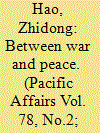| Srl | Item |
| 1 |
ID:
067482


|
|
|
| 2 |
ID:
158039


|
|
|
|
|
| Summary/Abstract |
This article argues that dominant political thinking during the Cultural Revolution supported antagonistic and fallacious logic, dictatorial, dehumanizing and violent thoughts and behavior in the service of purism and a fundamentalist ideology. It traces these views back to the Party’s earlier history and to human history in general. Using Pingzhou county, Shanxi province, as an example, the article focuses on the development of these attitudes during the land reform campaign of the 1940s, and their culmination in the Cultural Revolution of the 1960s. The evidence is based on local archival and interview data regarding these two events. Understanding the origin and development of Cultural Revolution thinking has important implications for understanding events in China today.
|
|
|
|
|
|
|
|
|
|
|
|
|
|
|
|
| 3 |
ID:
072146


|
|
|
| 4 |
ID:
149751


|
|
|
|
|
| Summary/Abstract |
Under Xi Jinping's administration, ideological control in China has been tightened and political dissent has become increasingly difficult, especially in universities. What can professors do? Our research in one university in central China finds that professors have multifaceted identities and engage in synchronous political roles as establishment/organic, non-establishment/professional and contra-establishment/critical intellectuals, although most take on the first two roles. Our research is based on 36 interviews with professors, students and administrators from various departments of this provincial university and on an analysis of the faculty's teaching and research. This paper aims to contribute to the sociology of intellectuals and higher education by illuminating how professors, as intellectuals, engage in contemporary Chinese political discourse.
|
|
|
|
|
|
|
|
|
|
|
|
|
|
|
|
| 5 |
ID:
110075


|
|
|
|
|
| Publication |
2012.
|
| Summary/Abstract |
The central government's pouring of money into the Tibetan Autonomous Region (TAR) or other Tibetan autonomous areas is apparently not really easing the tension in these regions. In response to Western criticism of the Chinese government policy in Tibet, President Hu Jintao says that the Tibetan problem is not about ethnicity, religion, or human rights, but about national unity or integrity. In fact, the Tibetan problem is about all of these things, and they are intertwined with one another. This paper attempts to understand each of them from an institutionalist perspective and to see in what way such an understanding of the problems may help solve them. Specifically, I first explain new institutionalism. Then I analyze the following problems from mainly a sociological new institutionalist perspective: (1) sovereignty and autonomy; (2) ethnicity and human rights; and (3) culture and religion. Finally I look at the possibility of social change under the institutionalist constraints. It is true that much research has been done on the Tibetan issue and the solution of it, but rarely do we see an institutionalist analysis. I hope that such an analysis will shed light on the understanding of the problem and help avoid the scene we see in the quote at the start of this paper.
|
|
|
|
|
|
|
|
|
|
|
|
|
|
|
|